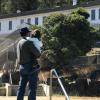San Francisco’s renowned Del Sol Quartet is expanding its mission to create and perform new music, while keeping its focus on immigrant history and culture.
A highlight of the quartet’s 21st season is its world premiere of Facing the Moon: Songs of the Diaspora, featuring San Francisco Poet Laureate Genny Lim with new music by Chinese-diaspora composers, on Oct. 19 at the Presidio Theater. Del Sol will then tour in China, and return home to participate in a Korean Experimental Music Festival at UC Berkeley and UC Santa Cruz.
Continuing the theme of Huang Ruo’s 2021 Angel Island Oratorio, Songs of the Diaspora celebrates immigrants during the annual Mid-Autumn Moon Festival. The festival is significant for immigrants, helping to maintain cultural identity and sharing their heritage in new countries. In Lim’s words:
“We are all immigrants
Facing the Moon
Strangers, clasping our children
To our bodies
The crucible of change
Lies in the alchemy
of dreams”
Songs of the Diaspora, says Del Sol cellist Kathryn Bates, who is also the director of the project, “grew out of the artistic collaboration between Del Sol and poet Genny Lim that began with the Del Sol commission of Huang Ruo’s oratorio. The work extends themes of migration and the Chinese-American experience.”
Between 1910 and 1940, the Angel Island Immigration Station processed some 500,000 immigrants from 80 countries, the largest number from China. Lim’s own family has a history with the island. Lim told SF Classical Voice that her purpose for the project was “to explore the theme of diaspora, not from a historical or political standpoint, but from personal, human experience.”
Lim’s poems served as the text for composers Theresa Wong, Meilina Tsui, and Vivian Fung to create what Lim calls “a tapestry of personal family stories of immigrating and assimilating in the U.S. — expressing the paradox of the American Dream.
“This opportunity to collaborate with three rising, international Chinese American women classical composers is a breakthrough for me as a poet,” she said. “Del Sol Quartet’s chameleon fluidity and range in inhabiting the emotional interior of almost any sound or form is their particular strength and genius.”
The composers spoke of their role in the project, starting with Theresa Wong: “At a Zoom event hosted by Del Sol, I heard Genny recite her poetry, and I felt an immediate connection to her spirit and to her words,” said Wong. “At this virtual gathering of the Last Hoisan Poets, I heard the sounds of my childhood — words in Hoisanwa, a Chinese dialect and my grandfather’s native tongue, colliding with the vibrant sound world of new music.”
“My piece, ‘A Scattering of Light by Particles,’ is written in just intonation, a tuning system based on the natural overtones of resonating frequencies. I’ve been exploring alternative tuning systems for many years out of an aesthetic curiosity of how new harmonies can sound but also as a philosophical question of how we can reflect the diversity of who we are as people. Harmony is like a direct metaphor for how we relate to each other.”
Meilina Tsui: “As someone who was born in Kazakhstan, raised in Hong Kong, and is now based in America, I often feel like an immigrant everywhere I go, a nomad carrying a complexity of backgrounds.
“The Songs of the Diaspora project has given me the opportunity to not only reflect on my own personal nomadic journey, but to be re-connected with the stories of my immigrant ancestors, who have inspired me to face adversity with courage, strength, and resilience.”
Vivian Fung: “Using the amazing poetry of Genny Lim, I give voice and expression to my deep-rooted emotions involving family, legacy, and trauma — subjects that have invaded my psyche of late as I have delved deeper into my own family’s history and that have served as fertile source material for many of my most recent projects.”
Project director Bates speaks of the shared interest in Angel Island by all participants: “While it was a piece of history for us, it was Genny’s own lived experience — we were building on her family’s time on the island and Genny’s efforts to preserve this part of Bay Area history from being forgotten.
“From the first time I heard Genny read her poetry, I could sense the power that she commands, from the words that she chose to the way she melodically enchants you with her voice into a world that she creates. The more we collaborated, the more I realized how words were simply the medium in which Genny made music. Thus, the idea of Facing the Moon: Songs of the Diaspora was born, with some wonderful seed funding from the Creative Work Fund.”
The more she worked on the project, Bates said, the more she realized how “the mainstream likes to oversimplify Chinese culture. How often do we refer to ‘Chinese’ food as if it’s one type of food, instead of the multitude of regional cuisines that would boggle most people’s minds? How do we discuss Chinese Americans who have been here for five generations or immigrants who came last year? How do we account for the massive economic disparities in what we consider one group?




